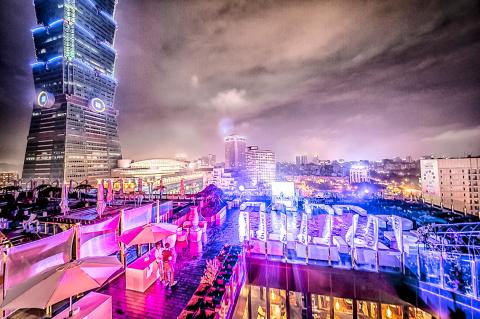One thing that has always been missing from Taipei’s nightlife is a proper rooftop bar with breathtaking views of the city. Fortunately for weekend warriors, that void has now been filled with Kloud, the newest addition to the roof at the hottest place in town, the ATT4FUN building.
After taking the elevators up to the tenth floor, customers walk up one more flight of stairs and are treated to a stunning glimpse of Taipei 101 and the illuminated Xinyi District (信義). Kloud is only open on Saturday nights at the moment, but Fridays will be added in July and August. One of the most unique things about Kloud is that it is an open-air venue, which means there is no covering for the tables or the DJs. While this is incredible when the weather cooperates, when it rains, things can get a little wet.
On most nights, the musical selection focuses on fist-pumping EDM, but tomorrow, Taipei’s Paris Nights takes over Kloud with The Lost Island party and promises a mix of tropical house, Caribbean rhythms, dancehall, electro and mash-ups provided by DJs Fratzuki, Cross Cutz and Cola.

Photo courtesy of Ray Wu
Three years ago, French flatmates Greg Colombet and Morgan Boudet decided that they really enjoyed the time they spent with their friends so they started inviting people over to their apartment all the time. While this was great for Colombet, Boudet and their friends, the neighbors were not so fond of these shindigs because more and more people kept dropping by. They then decided they needed bigger places to drink wine and listen to the music that they liked. It was at this time that they chose the name, Taipei’s Paris Nights, and decided to throw monthly themed parties at various venues around Taipei City.
“Paris has one of the leading scenes in the world regarding music and new trends It is a place where people are not scared to experiment, whereas we feel that Taipei is a little reluctant to try new things so we often end up at the same place, with the same people, listening to the same music,” Colombet by e-mail.
“Taipei’s Paris nights wants to show that anyone can have a great night in any bar, with new people and most of all listening to something else than Top 20 hit music.”
Over the past three years, Taipei’s Paris Nights have done pink parties, Roman orgy-themed parties, disco parties, beer pong parties and even a throwback party called Time Machine. Colombet’s favorite, though, was a 1920s-themed party at Barcode when they collaborated with fashion bloggers The Ginkgo Project. He said it was a huge success because everyone came dressed to the nines in 1920’s gear, the music was French and electroswing, and everyone stayed until the end on a Thursday night.
Overall, Taipei’s Paris Nights just want to throw memorable events.
“A good party is when you forget everything for one night, and as you go back home, you have this feeling of happiness which will probably vanish the next morning if you don’t drink water before going to bed,” Colombet said.
■ Taipei’s Paris Nights present The Lost Island tomorrow with DJs Fratzuki, Cola, and Cross Cutz from 8pm to 4am at Kloud, 10F, 12, Songshou Rd, Taipei City (台北市松壽路12號10F). Admission is NT$600, which includes two glasses of wine.

On April 26, The Lancet published a letter from two doctors at Taichung-based China Medical University Hospital (CMUH) warning that “Taiwan’s Health Care System is on the Brink of Collapse.” The authors said that “Years of policy inaction and mismanagement of resources have led to the National Health Insurance system operating under unsustainable conditions.” The pushback was immediate. Errors in the paper were quickly identified and publicized, to discredit the authors (the hospital apologized). CNA reported that CMUH said the letter described Taiwan in 2021 as having 62 nurses per 10,000 people, when the correct number was 78 nurses per 10,000

As we live longer, our risk of cognitive impairment is increasing. How can we delay the onset of symptoms? Do we have to give up every indulgence or can small changes make a difference? We asked neurologists for tips on how to keep our brains healthy for life. TAKE CARE OF YOUR HEALTH “All of the sensible things that apply to bodily health apply to brain health,” says Suzanne O’Sullivan, a consultant in neurology at the National Hospital for Neurology and Neurosurgery in London, and the author of The Age of Diagnosis. “When you’re 20, you can get away with absolute

May 5 to May 11 What started out as friction between Taiwanese students at Taichung First High School and a Japanese head cook escalated dramatically over the first two weeks of May 1927. It began on April 30 when the cook’s wife knew that lotus starch used in that night’s dinner had rat feces in it, but failed to inform staff until the meal was already prepared. The students believed that her silence was intentional, and filed a complaint. The school’s Japanese administrators sided with the cook’s family, dismissing the students as troublemakers and clamping down on their freedoms — with

As Donald Trump’s executive order in March led to the shuttering of Voice of America (VOA) — the global broadcaster whose roots date back to the fight against Nazi propaganda — he quickly attracted support from figures not used to aligning themselves with any US administration. Trump had ordered the US Agency for Global Media, the federal agency that funds VOA and other groups promoting independent journalism overseas, to be “eliminated to the maximum extent consistent with applicable law.” The decision suddenly halted programming in 49 languages to more than 425 million people. In Moscow, Margarita Simonyan, the hardline editor-in-chief of the